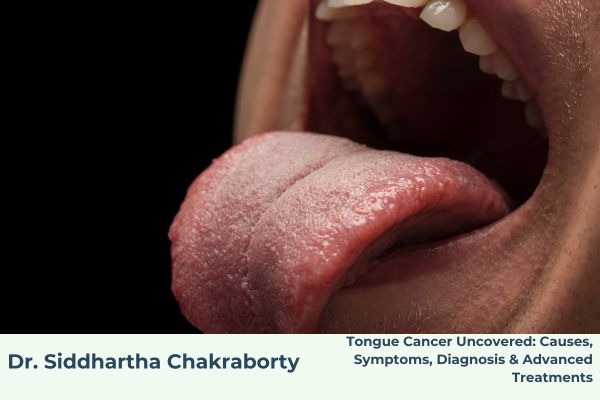Tongue Cancer Uncovered: Causes, Symptoms, Diagnosis & Advanced Treatments
Learn about tongue cancer, its causes, symptoms, risk factors, and the latest treatment options. Discover how early diagnosis and advanced therapies improve survival rates.
Dr. Siddharth Chakrabarty
3/8/20251 min read


Tongue Cancer Uncovered: Causes, Symptoms, Diagnosis, and the Latest Treatment Advances with Dr. Siddharth Chakrabarty
Tongue cancer is a type of oral cancer that develops in the cells of the tongue. It can affect the front, visible part of the tongue (oral tongue cancer) or the base of the tongue (oropharyngeal cancer). Dr. Siddharth Chakrabarty, a leading expert in cancer treatment, provides insights into the causes, symptoms, and latest treatment approaches for tongue cancer.
What Causes Tongue Cancer?
Several risk factors increase the likelihood of developing tongue cancer, including:
Tobacco Use: Smoking or chewing tobacco is one of the primary causes.
Excessive Alcohol Consumption: Heavy alcohol intake can damage tissues, increasing cancer risk.
HPV Infection: Human papillomavirus (HPV) is linked to some cases of tongue cancer.
Poor Oral Hygiene: Chronic irritation from dental issues or poorly fitting dentures.
Genetics: A family history of oral cancer may raise the risk.
Recognizing the Symptoms
Early detection is key to effective treatment. Common symptoms of tongue cancer include:
Persistent mouth sores that don’t heal
A lump or thickening in the tongue
White or red patches on the tongue
Pain while chewing or swallowing
Numbness or unusual bleeding in the tongue
Diagnosis and Screening
To confirm a diagnosis, Dr. Siddharth Chakrabarty recommends the following tests:
Physical Examination: Checking for lumps, sores, or unusual patches
Biopsy: A tissue sample is taken and analyzed for cancer cells
Imaging Tests: CT scans, MRI, or PET scans to assess the cancer’s spread
Advanced Treatment Options
Treatment for tongue cancer depends on its stage and severity. The latest approaches include:
Surgery: Removal of the tumor or part of the tongue if necessary
Radiation Therapy: High-energy beams target and destroy cancer cells
Chemotherapy: Drug treatments to shrink or kill cancer cells
Targeted Therapy & Immunotherapy: Advanced treatments focusing on specific cancer cells while minimizing damage to healthy tissue
Conclusion
Tongue cancer is a serious but treatable condition when detected early. Dr. Siddharth Chakrabarty emphasizes the importance of awareness, early screening, and personalized treatment approaches for better patient outcomes. If you notice persistent tongue or mouth issues, consult a specialist immediately.